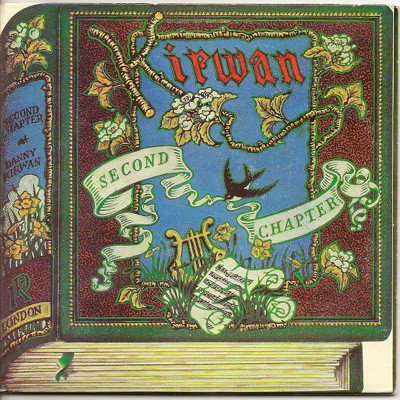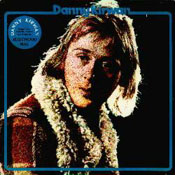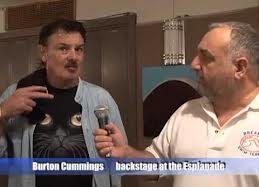
Second Chapter – Wikipediaen.wikipedia.org › wiki › Second_Chapter
Second Chapter is the debut solo album by British blues rock musician Danny Kirwan, released … Allmusic critic Joe Viglione declared that Second Chapter was a feather in the cap for Kirwan as well as producer Martin Rushent. Drawing …
SECOND CHAPTER AllMusic Review by Joe Viglione [-]
The first solo album from Fleetwood Mac singer/songwriter Daniel David Kirwan has the future producer for Human League and Buzzcocks, Martin Rushent, utilizing those skills here, as well as engineering. The sound is crystal clear, and a feather in the cap for Rushent as well as Kirwan. It starts off with an uncharacteristic “Ram Jam City,” which has more Lindsey Buckingham sounds than one would expect, especially since the two guitarists come from two different musical worlds. “Odds and Ends” is more lighthearted, the kind of music Paul McCartney toyed with on The White Album‘s “Rocky Raccoon.” What Second Chapter immediately sets forth is the importance of Kirwan as a pop artist, and how, despite Fleetwood Mac‘s success after he left, his sounds could still have been beneficial to that supergroup. “Hot Summers Day” is a fine example of that, a beautiful song that could offset Buckingham‘s gritty ramblings. It would have made a nice counterpoint as Stevie Nicks complemented Christine McVie‘s tunes with her adventures, bringing an important change of pace to that popular band’s hits. The jacket looks like a dusty old family album-style book holding Kirwan‘s Second Chapter. And the music reflects that old-world feel in titles like “Skip a Dee Doo” and “Falling in Love with You.” Three of the best songs on this excellent outing are “Love Can Always Bring You Happiness,” “Second Chapter,” and a sleepy and beautiful number called “Silver Streams.” Kirwan‘s tune is haunting as well with its lilting “all you need is love to show you the way from here” chorus. As on a follow-up album, he tends to sound a little like the group America, the vocals with that same America tone and warmth. They very well could have covered “Silver Stream” or “Cascades,” the album’s final track. This material was crafted right in the middle of America‘s run of hits, and maybe they should have replaced Dan Peek with Dan D. Kirwan? The artist’s three solo discs cut in the ’70s make for a very pleasant and thought-provoking listening experience, and that this collection is so good only shows he kicked his departure from the big band off with a vengeance. Collapse ↑
https://www.allmusic.com/album/second-chapter-mw0000583888 SECOND CHAPTER by Danny Kirwan

Danny Kirwan Midnight in San Juan https://www.allmusic.com/album/danny-kirwan-mw0001878717

https://en.wikipedia.org/wiki/Midnight_in_San_Juan_(Danny_Kirwan_album
AllMusic Review by Joe Viglione [-]
On his follow-up to 1975’s Second Chapter, his first solo disc after being such an important element of Fleetwood Mac, Danny Kirwan gives fans another taste of Bare Trees with the lovely song “Castaway,” which ends the album, and the instrumental “Rolling Hills,” which could be a sequel to the sublime “Sunny Side of Heaven,” a treat both when Fleetwood Mac performed it live and when it appeared on Bare Trees. Kirwan‘s personality shines on those tracks, and this album is chock-full of quality material — there isn’t a bad track on it musically. Where followers of this artist might have a problem is that it seems to be a conscious effort to go off in the commercial direction taken by the folk band America, of all people. Both tracks which open side one and two, “I Can Tell” and “Misty River” respectively, would have perfectly fit in America‘s “Sister Golden Hair,” “Don’t Cross the River,” and “Ventura Highway” set list. This is decidedly different music from the slick pop of 1979’s Hello There Big Boy, which retained only pianist John Cook from these sessions. That episode had him sounding more like his ex-Fleetwood Mac mate Bob Welch, no surprise since Welch actually charted in 1977 with his Bare Trees track “Sentimental Lady.” “Life Machine” on this disc actually sounds like a Bob Welch track, and it is too bad the two artists didn’t join forces at this point in time. The strange one here is a reggae version of “Let It Be,” which, in its brashness, becomes a nice turning point for the disc, showing real personality. Too many artists cover the Beatles note for note while Kirwan gives the world ten new originals and a creative reworking of a classic hit by “the Fab Four.” This album was titled Danny Kirwan in North America, while the British release took its name from the other instrumental track, a synthesized journey called “Midnight in San Juan.” “Angel’s Delight” and “Windy Autumn Day” sound like Fleetwood Mac meets the band America, a very saleable commodity if you think about it, the Beatles-style ending to “Windy Autumn Day” driving the point home. Dick James Records really should have gotten more solidly behind this artist — there’s no doubt the talent for Top 40 success here was enormous. https://www.allmusic.com/album/danny-kirwan-mw0001878717
https://www.allmusic.com/album/danny-kirwan-mw0001878717

AllMusic Review by Joe Viglione [-]
Hear the album here: https://youtu.be/0pwHWM8QYW4
This is not just a tremendous album by Danny Kirwan, this is an extraordinary set of recordings that makes one wonder “what if?” What if Fleetwood Mac had talents like Peter Green, Jeremy Spencer, Danny Kirwan, Dave Walker, and Bob Welch come back to the fold for different projects? This is light pop on a mission, and it is perfectly produced by, of all people, Clifford Davis (though one should consider Kirwan’s excellent production work on The Legendary Christine Perfect Album and wonder if the manager wasn’t just putting his name on Kirwan’s creative ideas). There’s no denying that each tune here, from “End Up Crying” (which sounds like the soft rock Fleetwood Mac) to the final track, “Summer Days and Summer Nights,” is superior pop music — intricate guitar lines, a double-barrel keyboard approach by John Cook and Kevin Kitchen which is just lovely, and sterling vocals by Kirwan. The track “California” is more accessible than some of the popular versions of Fleetwood Mac, and given Bob Welch’s success with French Kiss two years before the release of Hello There Big Boy!, it is surprising this was not embraced by both Top 40 and FM radio. “Spaceman” continues the smooth ’70s pop that”California” introduced the listener to, the guitars more eerie, harking back to the Bare Trees period of Fleetwood Mac seven years earlier (which had so much of Kirwan’s identity all over it). There was life before Stevie Nicks and Lindsey Buckingham, and this cohesive work is proof of that; covering Randy Edelman’s “You” is actually quite clever, the exiles of Mac having reputations more as singer/songwriters than as interpreters. This may be Danny Kirwan produced by Clifford Davis, the man who put the fake Fleetwood Mac onstage, but it is no fluke and it is no fake. Hello There Big Boy! is a great album from the singer/guitarist who, according to Mick Fleetwood’s book My Twenty Five Years in Fleetwood Mac, “went beserk…smashed his head against the wall…(and)…was fired.” Sounds like genius, and it is here on this recording for all to see — and hear. A truly great comeback that sadly got lost in the shuffle of life. On AllMusic.com https://www.allmusic.com/album/hello-there-big-boy%21-mw0000845773
